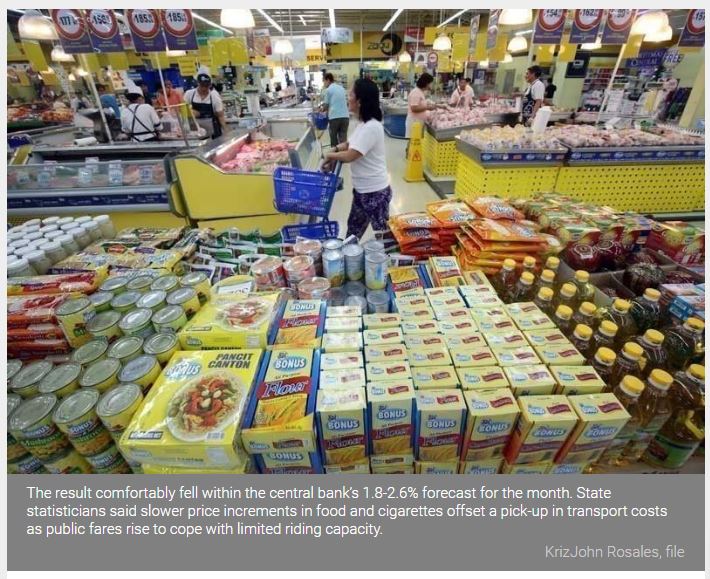Philippines: Inflation slows in September as demand struggles to recover
MANILA, Philippines (UPDATE 12:11 p.m., Oct. 6) — Inflation slowed for the second straight month in September despite key economic centers returning back to business after a brief lockdown the previous month, reflecting a long way back to reviving consumer demand.
Consumer prices rose 2.3% year-on-year in September from 2.4% the previous month, the Philippine Statistics Authority (PSA) reported on Tuesday.
The result fell comfortably within the central bank’s 1.8-2.6% forecast for the month. State statisticians said slower price increments in food and cigarettes offset a pick-up in transport costs as public fares rose to cope with limited riding capacity.
More broadly however, the slowdown is consistent with the Bangko Sentral ng Pilipinas’ (BSP) expectations of benign inflation getting sustained until yearend. For the first 9 months, inflation averaged 2.5% year-on-year, running within the official 2-4% target for the year.
While low inflation is typically good news, it can also indicate a consumer demand struggling to recover from lockdowns that crippled businesses and left millions jobless. With demand for products and services lagging behind, there may be little reason for enterprises to hike prices.
“The latest result is consistent with BSP’s assessment that inflation is expected to remain benign over the policy horizon with the balance of risks tilting toward the downside,” BSP Governor Benjamin Diokno said in a Viber message to reporters.
“(This is) due largely to the impact on domestic and global economic activity of possible deeper economic disruptions caused by the coronavirus pandemic,” Diokno said.
By region, prices in Metro Manila rose at the same pace as last month at 2.2% annually. Outside the capital, faster increases in commodity prices were noted at 2.4%. Seven regions outside the National Capital Region (NCR) experienced faster inflation.
Demand weakness prevailing?
For Nicholas Antonio Mapa, senior economist at ING Bank in Manila, domestic activity outside the capital may be improving, but spreading that to NCR will be difficult with “elevated job losses” hampering spending abilities and broader economic activity.
“Domestic demand remains extremely anemic and we see this trend continuing for the rest of the year with true inflation likely even lower than the 2.3% print,” Mapa said in an e-mail.
On top of tepid demand, the strong peso, which has appreciated around 4.6% this year against the dollar, also tempered prices of imported goods such as oil leading to slower inflation, Emilio Neri Jr., lead economist at Bank of the Philippine Islands, said.
Unlike Mapa however, Neri believes a rebound in consumption is underway, which in turn can see inflation accelerate. “That imports and (Customs) collections picked up in July and August versus April to June could indicate that demand has been improving,” he said in an e-mail.
There are some signs this is happening. Excluding volatile food and energy prices, core inflation was higher and gained pace to 3.2% year-on-year in September from 3.1% in August. While food, beverages and tobacco prices slumped as well, utility prices picked up.
The biggest gain, however, was recorded in transport prices that rose an average of 8.3% year-on-year from 6.3% in August. Broken down, tricycle fares surged 45.7% annually, while that of jeepneys increased a slower 5.3%. “What we are seeing is that because of social distancing, some transport players really increased fares to cope with losses,” National Statistician Dennis Mapa said at a briefing.
That said, Sanjay Mathur, ANZ chief economist, believes inflation “is not an issue” for the Philippines this year. This, in turn, gives the central bank more reason to lower benchmark rates and encourage bank lending on its last two policy meetings in November and December.
BSP has slashed rates to record-lows this year to entice consumers to borrow funds and spend, while giving lenders more funds to give by lowering their reserve requirement.
“The larger issue is that policy transmission needs to improve such that it becomes more effective,” Mathur said in a separate e-mail.
Source: https://www.philstar.com/business/2020/10/06/2047566/inflation-slows-september-demand-struggles-recover


 English
English




